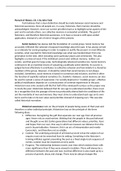Samenvatting
Samenvatting Study of History werk+hoor
- Vak
- Instelling
- Boek
Een complete samenvatting van geschiedwetenschap/study of history van de Universiteit Utrecht. Alle leesstof van de werkcolleges is samengevat alle aantekeningen van de hoorcolleges.
[Meer zien]




